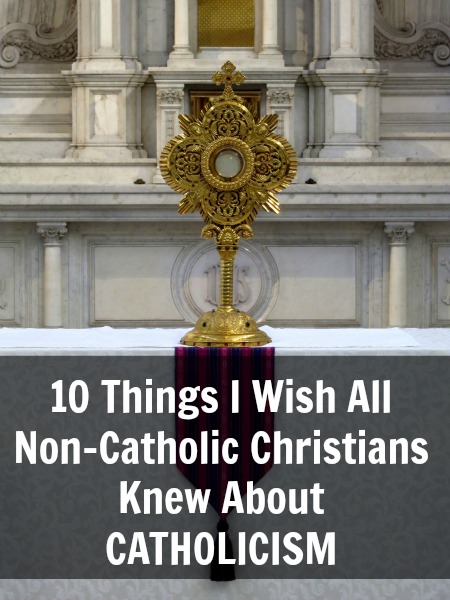10 Things I Wish Non-Catholic Christians Knew About Catholicism
Note: This post contains affiliate links for which Catholic Newbie may earn a small commission if you purchase items (at no additional cost to you) when clicking through.
I’ve had several interactions with non-Catholic Christians since my conversion where I’ve realized they are not aware of some basic tenets of our faith that I think would go a long way in bridging any divides between us and provide them, at least, with some perspective of where we are coming from and a more accurate understanding of our beliefs.
We shouldn’t expect non-Catholics to know about the Catholic religion unless they’ve taken the time to explore it for themselves. I certainly did not know any of these things before seeking out the Church, but I definitely wish I had!
So, non-Catholics, here are 10 things I, a former non-Catholic :), want you to know about Catholicism:
1. We believe that Jesus is physically present in the bread and wine we consume at every Mass
I think this one fact explains so much about the Catholic faith that is misunderstood by non-Catholics. This is why we have to go to mass every week, this is why our churches are ornate and our vessels are made of precious metals, this is why non-Catholics cannot receive communion unless they have professed their belief, this is why if a wafer falls on the floor it is treated with the utmost reverence.
This is why we cannot be satisfied in any other church — we cannot leave Jesus behind. This belief in the physical presence of Jesus dates back to the first Christians. Read the words of St. Ignatius of Antioch (who knew the Apostle John and was born in 35 AD) in his Letter to the Romans about the presence of Jesus in the Eucharist.
A great, easy-to-read book on this topic is the “7 Secrets of the Eucharist” by Vinny Flynn.
2. We believe you can go to heaven, too!
I think many non-Catholics may wrongly assume that Catholics think they are the only ones getting into heaven. We are not God; only God knows such things. We do believe that we have found the path that gives us the most assistance in entering heaven through the sacraments Jesus left behind (communion, marriage, reconciliation/confession, confirmation, etc.) but we certainly don’t think the doors are only open to us.
3. We believe in the authority of the Pope and the Church of Rome, because that is what early Christians practiced
Again, see the Letters of St. Ignatius in his deference to the Church of Rome along with the example of many other early Christian leaders (email me for more). We are following the example of what the apostles taught the early Christians. Great article on this topic.
I highly recommend doing this research and reading early Christian documents for yourself. Don’t take my word for it! Catholic Answers has a great book called “The Fathers Know Best: Your Essential Guide to the Teachings of the Early Church” by Jimmy Akin that is a good overview of this topic.
4. We follow what the early Christians practiced in our “Tradition,” because there was 300 years before we had a list of New Testament books
The Catholic Church’s teachings are based on both Scripture and what the Church refers to as “Tradition.” Tradition is factored in, because there was a period of 300 years after Jesus’ death and before any list of New Testament documents was compiled. We follow the tradition that was practiced during that time, because it was comprised of the beliefs, teachings and rituals handed down from Jesus himself to the apostles and on to their successors.
It’s also interesting that there was a period of at least 20 years between Jesus’ death and when the first writing from the New Testament (by Paul) was even written. And it was likely at least THIRTY years before the first gospel was even written.
What did Christians do before we even had a single New Testament writing to follow? They held fast to what the apostles taught them. THAT is tradition that is preserved and continues to be handed down to this very day. And the New Testament is a part of that tradition, because the disciples of the apostles had to decide what to include and what not to include based on what they had been taught.
This includes teachings like Mary’s Immaculate Conception (she was conceived without sin in order to give birth to God as man), her Perpetual Virginity (she never had any other children and remained a virgin) and her Assumption body and soul into heaven, beliefs that were held by early Christians and only made “official” by the Church after they were challenged over time.
Many wrongly hold that these doctrines were created at the councils where they were affirmed, but rather the councils simply made official these doctrines long held and practiced by early Christians.
Great books to read more about the Church’s teachings on Mary include “Behold Your Mother: A Biblical and Historical Defense of the Marian Doctrines” by Tim Staples and Meet Your Mother by Mark Miravalle.
5. We hold many of the same beliefs!
We are not so different. We belief in the sanctity of all life from conception to natural death. We believe in Jesus, the son of God who came to reconcile us with the Father. We believe that everyone needs to hear the Good News and that it’s our job to go out and tell the world! We believe in the sanctity of marriage between one man and one woman. That’s just the beginning…
6. Confession is not a place to get rid of all your wrongdoings without contrition only to go back and do them again
I remember watching a movie of a young man returning to the priest every week to report how often he masturbated, only to go back and do it all again. That’s not the goal and your sins are not forgiven that way. The idea is to go confess your sins with true repentance (not with plans to go right back and do them again), receive forgiveness and graces (heavenly assistance) to keep from doing those sins again from Jesus (Did you know that we believe that Jesus is present in the priest in the confessional?), and to try earnestly not to commit those sins in the future.
An easy-to-read book on Confession is “7 Secrets of Confession” by Vinny Flynn.
7. There is an unbroken line of succession from Jesus to Peter to all Popes and Bishops
This fact initially blew me away during my education on the Church. The Catholic Church can trace a laying on of hands (as was done in the Acts of the Apostles when they added deacons) all the way back from Jesus to Peter to all Popes and Bishops. That is powerful stuff!
8. We read the Bible, too!
Over a period of three years, if you attended daily mass, you would hear readings from nearly every book in the Bible. And, of course, we do plenty of Bible reading on our own, as well, though you may find us less likely to be able to tell you the chapter and verse, but that doesn’t mean we aren’t educated on God’s inspired word.
In fact, Catholicism taught me a key fact about the Bible that makes it so much more interesting: it’s called typology and it means that the Old Testament foreshadows the events of the New Testament and the New Testament fulfills the Old. It’s fascinating to see the parallels, such as between Abraham and Jesus, Adam and Jesus, Mary and the Ark of the Covenant, Eve and Mary, and on and on and on.
Here’s a fascinating read on that topic: New Testament Basics for Catholics by John Bergsma (hands down one of the best books I’ve ever read!).
9. The Catholic Church is made up of sinners.
Yes, we are a Church of sinners. That is why Jesus came to reconcile us, but despite his help and graces we still remain in the fallen state of sin inherited by Adam and Eve.
Yes, we have child molesters. Yes, Catholics have done bad things in the name of religion. Yes, we have murdered, stolen, been greedy, disobeyed God and more. But so has the rest of the world; it’s part and parcel with being a part of fallen humanity.
Such wrongdoers should justly be punished and will certainly be judged by their actions on the last day. Jesus, however, promised that nothing would prevail against the Church (not even sinners) and left us with the Holy Spirit (not humans) to guide it.
That’s why we hold true to the teachings of the Church, no matter its sinners, and why even if a priest is a sinner, his sacramental actions are still valid. They are not his works, but those of the Holy Spirit and Jesus within him.
10. Don’t let hypocritical Catholics mislead you.
I’ve often been pointed to examples of Catholics who don’t follow the truth of the Church in the way they live their lives as reasons why the Catholic church is wrong or bad. As above, we are made up of sinners just like the rest of the world, and there will be these people.
But don’t let them cloud your image of the Church left by Jesus. The priest who asked for a bribe for an annulment was wrong; the Catholics shouting obscenities at the Notre Dame football game are wrong; the politician promoting abortion rights receiving communion is wrong.
But like all sinners, Jesus welcomes them to repent, stop their wrong actions and come back to the fold. Rather, I challenge you to seek devout Catholics who live their faith fully. You will find models of holiness and witnesses of Christian joy beyond your wildest imaginings.
Thanks for taking the time to read. What questions do you have about Catholicism?
Read More:
- What Catholics Need to Know About Pornography
- My favorite Catholic Resources & Catholic Books
- Why did I convert to Catholicism? Read my Conversion Story
- Catholic Newbie’s Most Popular Posts
- How to Start a Conversation about Catholicism Anywhere
- 13 Things to Do After RCIA to Keep Your Faith on Fire
- 11 Ways to Work the Rosary into Your Busy Day
- The 1 Thing I Wish All RCIA Candidates Knew About Confession
- My First Reconciliation/Confession Experience




